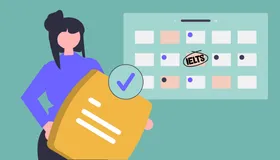Why should you take the IELTS General Training test?
The IELTS General Training test is a great way to prove your English skills. This test is designed to assess your English language skills in everyday situations.
You should take this test if:
- You're looking to move abroad for work or education purposes.
- You wish to undertake vocational training or study below degree level.
- Emigrate to English-speaking countries(e.g. Australia, Canada, New Zealand, and UK)
- You want to get a job in an English-speaking country or improve your employment prospects in your own country.
By acing the IELTS General Training test, you can boost your career opportunities globally. A good score can give you an edge in the job market. Many employers and organisations require IELTS scores as proof of English proficiency. So, it's definitely worth considering if you want to enhance your career prospects!
At a glance:
| IELTS General Fee | INR 17,000 |
| Number of Sections | 4 |
| Sections | Listening Reading Writing Speaking |
| Modes of Exam | Paper-based and Computer-based |
| Duration | 2 hours 45 minutes |
| Band Scale | 0-9 |
| Frequency of Availability | Paper- Based: Twice a month Computer-Based: All days |
The IELTS general training exam can be taken either on paper or on a computer. Both exam modes are exactly the same in terms of format, question types, duration and content. The only difference is in the test day experience. If you choose the computer-based test, you'll get your results sooner.
You can choose the test mode based on your preferences. The results are available online within 3-15 days of the exam.
Also Read: IELTS Exam Fees 2024
IELTS General Training Format
The test is divided into four sections: Listening, Reading, Writing and Speaking.
The Listening, Reading, and Writing sections can be taken on the same day, back to back, without any breaks in between. While the Speaking test is a bit more flexible. You can take it on the same day or even a week before or after your main test day. The good news is that you can choose a time slot online for a speaking test that works for you!
Each section has its own question types and marking criteria.
Below is the overview of the IELTS General Training test format given in the table below:
Sections | Questions | Duration |
| Listening | 40 questions 4 parts | 30 minutes (plus 10 minutes to transfer your answers to an answer sheet) |
| Reading | 40 questions 3 sections | 60 minutes (including transfer time) |
| Writing | 2 tasks | 60 minutes |
| Speaking | 3 parts | 11–14 minutes |
Now, let’s explore each section of the IELTS Generation training test.
IELTS General Listening
In the Listening section, you'll hear recordings of everyday conversations and discussions on topics you might come across in daily life.
The Listening section has 4 parts with 10 questions each. You'll hear the recording once in a variety of accents.
Here’s what to expect:
Part 1: Conversations between two people on everyday topics.
Part 2: Monologues on general topics(e.g. shopping, transportation, and housing)
Part 3: Conversations between up to four people on topics like education and employment
Part 4: Monologues on academic topics(e.g. news and current events)
Question types
- Multiple choice
- Matching information
- Plan/map/diagram labelling
- Form/note/table/flow chart/summary completion
- Sentence completion
- Short-answer questions
Marking Criteria
For each correct answer, you will earn one point. The total raw score out of 40 is converted to the IELTS 9-band scale. The scores are given in whole and half bands.
At the end of the section, you will get only 10 minutes to transfer your answers to a sheet. Make sure to check your spelling and grammar, as you can lose marks for it.
IELTS General Reading
The Reading section tests your ability to understand short and long texts on everyday topics. You'll have three sections of increasing difficulty to read. This section includes a variety of reading materials, such as advertisements, notices, and newspaper articles.
Here’s what to expect:
Section 1: Short texts(2-3) on everyday topics like news, education, and employment
Section 2: 2 texts on work topics(e.g. job descriptions, contracts, staff development and training materials.)
Section 3: 1 Long texts on general topics(e.g. politics, economics, and social issues)
Question types
- Multiple choice
- Identifying information (True/False/Not given)
- Identifying writer’s views/claims (Yes/No/Not given)
- Matching information
- Matching headings
- Matching sentence
- Sentence completion
- Summary/note/table/flow-chart completion
- Diagram label completion
- Short-answer questions
Marking Criteria
Similar to the listening section, you will earn one point for each correct answer. The total raw score out of 40 is converted to the IELTS 9-band scale. The scores are given in whole and half bands.
IELTS General Writing
The Writing section tests your ability to write clearly and effectively on general topics. You'll have two tasks to complete. In this section, you must write your answers using full sentences instead of using notes or bullet points.
Here’s what to expect:
Task 1(20 minutes): Write a letter or email on a general topic (150 words)
Task 2(40 minutes): Write an essay in response to a point of view, argument or problem.( (250 words)
Marking Criteria
In the general writing section, each task is examined separately and carries different weightage. The task 2 carries more weight than task 1 in your overall writing score.
The examiners assess your writing score based on four criteria:
- Task achievement (for task 1) and task response (for task 2)
- Coherence and cohesion
- Lexical resource
- Grammatical range and accuracy.
Make sure to plan your writing, use appropriate vocabulary and grammar, and proofread your work to avoid mistakes. You'll have 60 minutes to complete both tasks, so manage your time well to finish both essays.
IELTS General Speaking
The Speaking section is a face-to-face interview with the examiner. It assesses your spoken English, and you'll be asked to talk about familiar topics and engage in a discussion. The conversation consists of three parts.
Here’s what to expect:
Part 1(4 to 5 minutes): Introduction and small talk about familiar topics, such as home and family, studies or interests.
Part 2(3-4 minutes): Talk about a particular topic given through a cue card.
Part 3(4 to 5 minutes): Discussion with the examiner related to part 2 topic.
Marking Criteria
Similar to the writing section, each task is examined separately and carries a different weight.
The examiners assess your speaking score based on four criteria:
- Fluency and coherence
- Lexical resource
- Grammatical range and accuracy
- Pronunciation
The examiner gives you a score from 1-9 for each of these four criteria, and your final Speaking score is the average. Each criterion accounts for 25% of your total marks.
Make sure to speak clearly and confidently to avoid losing marks in this section.
To learn more about the IELTS exam syllabus & Pattern 2204, click here.
IELTS General Training Dates 2024
The IELTS test is available throughout the year. However, the availability of test dates can vary depending on whether you're taking the Academic or General Training module.
The General Training module is available on 24 dates only.
To make things even more convenient, most of these tests are scheduled on Saturdays and Thursdays. So you can choose a day that best fits your schedule.
Before we talk about the IELTS General Training exam Dates, you need to know certain things, such as:
- The IELTS general training computer-based test offers much more flexibility with time slots. It's available on all days of the week except public holidays. You can schedule your exam on any weekday, with three different time slots available each day to fit your schedule.
- On the other hand, the IELTS general training paper-based test is available only twice a month.
- The usual slots for IELTS general training exam dates are as follows:
- 09:00 AM to 12:00 PM
- 01:00 PM to 04:00 PM
- 05:00 PM to 08:00 PM
Here are the key IELTS General Training exam dates for 2024.
Computer-based test
Months | Dates |
| July | |
| August | All days of the week, except public holidays. |
| September |
Paper-based tests
Months | Dates |
| July | 6, 27 |
| August | 8, 24 |
| September | 14 |
Note: With so many test dates available, it's easier than ever to find a time that works for you. Just make sure to register early, as spots can fill up quickly!
To check the city-wise list of IELTS general training exam dates, click here
IELTS General Training Eligibility Criteria
There are no specific requirements for the IELTS general training test. However, there are some basic requirements that you must meet:
- To apply, you must be at least 16 years old. There's no upper age limit.
- There is no educational background requirement to sit for the exam.
- You will need a valid passport(mandatory) to prove your identity.
Please note that there are strict guidelines for having a passport for identification purposes during registration and at the test centre. You will not be allowed to sit for the exam without this identity.
And with that, let's move on to the registration process for IELTS General training.
Read more about the IELTS Exam Eligibility Criteria here.
How To Register for IELTS General Training?
Registering for the IELTS General Training test is quite straightforward. The IELTS registration for general training tests can be done both online or offline at any IDP branch.
Here’s a quick guide on how you can apply for the IELTS general training test:
- To register online, just log in to your account at the IDP IELTS India Website.
- Click 'Register for IELTS' to create your IDP IELTS login.
- Choose your preferred test mode: Computer/ paper-based IELTS
- Then, you can choose the IELTS test type/module you wish to take. (Academic or general training)
- Pick your desired test location/city from the available IELTS test centres in India.
- Once you've found a test centre, book your test according to the available test dates. Select the date and time slot that works best for you.
- Fill out the online application form by entering your personal details. Then, to complete the process, make sure to upload a clear, scanned colour copy of your passport.
- Pay the application fee(INR 17000), typically using a debit or credit card
- After registering, you'll get a confirmation email with all the details. Now you can focus on prepping for the test and acing that General Training test!
Note: Make sure to check the official IELTS website or with your local test centre for the most up-to-date information. Seats fill up quickly, so plan ahead!
To know other methods of IELTS general training registration, click here.
Also Read: IELTS Test Centre in India 2024
IELTS General Training Band Score
The IELTS General Training Band Score reflects your English proficiency in a work or immigration context. Your test results are scored on a band scale of 0 to 9, with 9 being the highest. This score shows how good you are at English, from basic to expert levels.
The score is calculated based on your performance in the four sections: Listening, Reading, Writing, and Speaking. You'll get a score for each section. The overall band score is the average of all the four section band scores rounded to the nearest half band.
If you want to score well for IELTS general training, make sure to work on improving your skills in all these areas.
Here’s a conversion table for your reference.
IELTS General Listening Raw Score | IELTS General Reading Raw Score | IELTS Band Score |
16 | 15 | 5 |
23 | 23 | 6 |
30 | 30 | 7 |
35 | 35 | 8 |
For Writing and Speaking sections in IELTS general training test, the band score is calculated on the basis of the assessment criteria of each section.
Now, let's take a look at some helpful tips for IELTS General preparation.
Tips for Prepare For IELTS General Training
Preparing for IELTS General Training might seem daunting. But don't worry, we've got some valuable tips to share with you.
Here are some great tips for you to prepare for IELTS general training:
- Practice with IELTS general reading tests to familiarise yourself with the test format.
- Plan out your study schedule and stick to it.
- As IELTS is a timed exam, make sure you practise under time constraints.
- Use official IELTS study materials and books to get a feel for the real test.
- Improve your IELTS vocabulary by learning new words, phrases, and idioms.
- Start your IELTS preparation early(1-2 months prior) to ensure thorough readiness for the test. This will help you identify areas for improvement.
By following these tips, you'll be well-prepared to take the test and achieve your desired score.
Also Read: IELTS General Training Practice Test
IELTS General Training Result
The IELTS general training results are valid for a maximum of two years. The availability of your result depends on the test format you have chosen: computer-based or paper-based.
If you opt for the paper-based test, you can expect your results in about 13 days. For the computer-based test, it’s usually within 3-5 days. You can check your results online using your candidate number and other details.
Make sure to check your account and download your IELTS results! You'll also receive a paper Test Report Form (TRF) by post, which is an official document that proves your scores.
How to Send your IELTS General Training Test Scores to your Work Organisation?
Once you’ve got your results, it’s time to share them with your work organisation. Sharing your official IELTS scores is easy.
Before you send your scores to the organisation, make sure that the organisation you're applying to accepts IELTS scores. You can check this on the IELTS website or on the organisation's website.
To submit your scores, you have a few options.
You can either:
- Ask your test centre to send your scores directly to the organisation (up to 5 organisations are free, then there's a fee).
- Upload your TRF to the organisation's online application portal (if they allow it).
- Send a certified copy of your TRF to the organisation via courier (if they require it).
Here is a stepwise process to share your IELTS General Training test scores with your work organisation:
- Go to the official IELTS website and create your account.
- Once you're logged in, look for the "add TRF" section.
- Here, you'll need to enter some details and pick the organisation you want to send your IELTS score to.
- After that, you'll need to select the mode for sending your TRF, either electronic or physical.
- Once you've made your choice, just click on the submit button. Your request will be sent.
- After that, the IELTS test centre will send the TRF to the specified organisation at no extra cost.
Note: If your test centre has closed, you can still send your IELTS results to the organisations you've chosen by completing the Additional IELTS TRF. You can use this service for up to two years from your test date, but keep in mind that there's a fee for this service.
Also Read: IELTS Slot Booking












